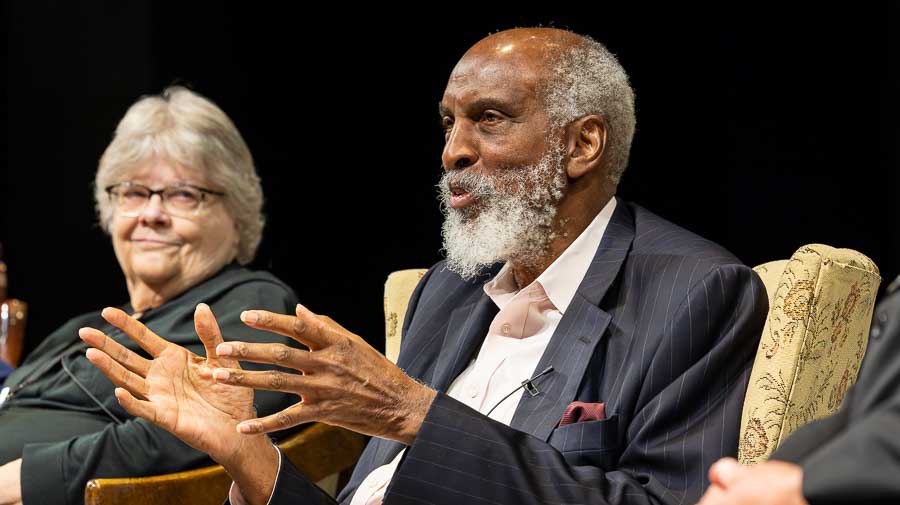The court’s seven justices heard arguments centering on a 2021 challenge to an Oregon law regulating vape products “packaged in a manner that is attractive to minors”
By Shaanth Nanguneri, Oregon Capital Chronicle
The Oregon Supreme Court questioned the scope Wednesday of an Oregon measure struck down by a lower court that regulated vape packaging in a case highlighting the tension between the state’s free speech protections and regulation of corporate activity.
The court’s seven justices heard arguments from the state Department of Justice and an Arizona-based libertarian think tank on a case involving a 2015 Oregon law that prohibits the sale of vape systems which are “packaged in a manner that is attractive to minors.” The Oregon Court of Appeals in an October 2024 ruling struck down the law on the grounds that it impinged on the free speech rights of owners of a Portland vape shop, but the state appealed the decision.
The 2015 law delegated authority to define attractiveness to minors to the Oregon Health Authority, which has offered various non-exhaustive lists over the years cautioning against the inclusion of symbols such as animal shapes, cartoons, celebrities, candy and desserts as well as words like “tart,” “fire,” “cool” and “juicy.” The agency amended its rule in 2023 to focus on recognizable toys, candy and images of minors.
“Correct me if I’m wrong, but I think there’s a concession that at least some of the things that OHA has prescribed, if nothing else in the earlier rule, even if consistent with the statute, run afoul of free speech protections,” said Chief Justice Meagan A. Flynn during the hearing, floating the option of narrowing the law and providing the agency clearer guidelines.
Carson Whitehead, a senior assistant attorney general with the Oregon Department of Justice, responded that the agency would find that guidance more helpful than the previous ruling striking down the law. He argued in front of the justices that the law and the suggested prohibitions put forth by the health authority were separate issues and that the appeals decision left little clarity for the agency to respond.
“I think we would welcome that,” he said. “And the problem with the Court of Appeals opinion was that it’s (a) very blunt tool.”
The case traces back to Portland-based vape store Division Vapor, owned by Paul Bates. He sought a declaration of his rights and an injunction against the law in a 2021 lawsuit filed in Multnomah County Circuit Court that ended in a summary judgment for the Health Authority. He had argued that the state law costed him and his employees hours of paid time spent on covering symbols in a store that is aimed at helping adults, not kids, transition away from smoking.
Despite the loss, Bates won an October 2024 ruling in the Oregon Court of Appeals which concluded that “the ‘attractiveness’ of the manner of packaging is expressive speech” and cannot be regulated without impinging on First Amendment protections. Oregon has one of the strongest free speech protections codified into law and its constitution, according to the National Association of Attorneys General, which notes that the state has “no means-end balancing, no levels of scrutiny and no commercial speech doctrine that permits greater government regulation.”
Bates’ attorney on Wednesday argued that narrowing the law doesn’t go far enough because the vagueness of the statute is inherently flawed. He said the health authority doesn’t have the right to “carve out a subset of prescribed conduct” and said the current rule “doesn’t really narrow the field at all.”
“I don’t think the agency has the authority just to arbitrarily say ‘we’re only going to enforce the attractiveness prohibition in certain ways but not other ways,’” John Thorpe of the Goldwater Institute told the justices. “And it hasn’t done so.”
In a brief interview after the hearing, Thorpe said he found the justice’s response to his remarks encouraging. He said the health authority has put his client in an impossible position, offering an example of how Bates had to cover a cherry fruit flavor label created by a manufacturer.
“I think the justices asked some really acute, astute questions,” he said. “They were clearly engaging with the arguments.”
Shaanth Kodialam Nanguneri is a reporter based in Salem, Oregon, covering Gov. Tina Kotek and the Oregon Legislature for the Oregon Capital Chronicle. This story previously appeared in the Oregon Capital Chronicle.



















